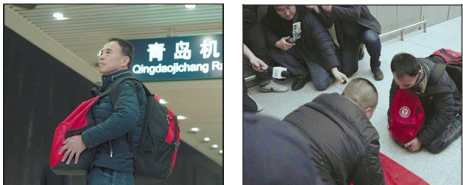Village chief returns ashes to ancestral homelands

This year, before Qingming Festival, or Tomb Sweeping Day, fell on April 4, Liu Te-wen, from Taiwan, made several trips to the Chinese mainland.
He hoped to fulfill the wishes of veterans who, after passing away in Taiwan, wanted to have their ashes taken back to their hometowns on the mainland.
On the evening of March 11, Liu landed at an airport in Qingdao, Shandong province, his red backpack bearing the words "Taking you home". Within it was a 12-kilogram urn containing the ashes of a deceased veteran born in Qingdao, who had been stranded in Taiwan since 1947 due to the separation between the two shores.
Upon seeing Liu at the airport, the grandson of the deceased said: "Grandpa, your grandson is here to take you home. Grandpa, you're home."
As Liu stepped forward, the relatives waiting at the airport approached, their eyes shimmering with tears, kneeling down to pay their respects.
Liu carefully took out the urn from his bag and placed it on the ground to signify the return home. The urn, wrapped in red cloth, is a symbol of Liu's belief that homecoming is a joyous occasion.
Liu is the chief of Xianghe village in Kaohsiung, where there used to live nearly 2,000 veterans from the mainland who had no families in Taiwan. The buildings are now empty, a sign that most veterans have passed away.
He handles all matters in the area, but what he cares about most is the lives of the veterans. He arranges regular checkups for them, meal deliveries and organizes various activities during holidays.
During traditional festivals he delivers zongzi and mooncakes, doing everything he can to make them feel at home. Day after day, with his love and care Liu has forged deep bonds with the veterans.
One day in 2003, a veteran surnamed Wen, originally from Hunan province, made a request to Liu for him to take his ashes back to his hometown when he dies and bury them in front of his parents' grave, as he wished to fulfill his duty as a son.
"Even now after more than 20 years I still remember his words clearly," Liu said.
In 2003, direct travel routes across the Taiwan Strait hadn't been fully established and there were no high-speed trains. After Wen passed away, Liu departed from Kaohsiung on Dec 31, 2003, passing through Hong Kong, Hunan's Changsha and Changde, and on Jan 1, 2004, he finally delivered the veteran's ashes to his home in the countryside of Taoyuan county for burial.
"A promise is to be kept," he said. From then on for over 20 years Liu has escorted over 300 veterans' ashes back home to the mainland.
At first, Liu only helped veterans from his community whom he knew well personally, but with the spread of the internet, more requests from veterans' relatives from the mainland made his cross-Strait trips more frequent.
On March 12, at the exit of Weifang Railway Station, Ju Zhiliang, 50, finally received the ashes of his grandpa, who had been away from home for 77 years. He buried the ashes shortly before Qingming Festival.
Last year, Ju came across news of Liu escorting the ashes of elderly veterans back to their hometowns on the mainland and was deeply moved. He eventually contacted Liu.
"It was my father's long-held wish for decades. What Chief Liu is doing is deeply moving for those of us with elders residing in Taiwan," Ju said.
Among all the trips, one to Xuzhou, Jiangsu province, brought Liu an unexpected discovery about his own family roots.
While escorting a veteran's ashes home to their relatives on the mainland he was asked about his family name. Liu told the locals it was Pengcheng, to which the local said: "Oh Pengcheng is an old name for Xuzhou".
"As a child, I'd seen the family name plaque... Only then did I realize that my ancestors came from there," Liu said.
"We are born of the same roots from one family. We should stay connected and visit more. It's our shared belief that we must never be separated," he said.


Today's Top News
- China issues rules to regulate pricing practices of internet platforms
- US hits over 70 IS-linked targets in Syria in massive retaliatory strikes
- Technological innovation brings China's cultural heritage alive
- Consumption to play bigger part in growth
- Opposition moves to impeach Lai
- Ties with Beijing underscored in Putin remarks






























